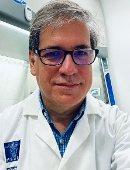
Adolfo Garcia Ocana, PhD
About Me
Dr. Garcia-Ocaña’s research interest over the years has been to study tissue regeneration, growth promoting agents and intracellular signaling. More specifically, his research group is currently working in three areas of research: First, his research group is studying the role of agents that can induce robust pancreatic beta cell regeneration in vivo using mouse models of human islet transplantation. In collaboration with Drs. Andrew Stewart, Peng Wang and Robert DeVita, his group is testing the effect of harmine and harmine derivatives on human beta cell expansion in mice transplanted with human islets using 3D imaging techniques. These studies could have strong implications for future therapies aiming at increasing the number of insulin-producing cells in diabetic patients. Second, since beta cell regenerative therapies will require, at the same time, treatment with pancreatic beta cell protective agents and immune tolerance enhancers for type 1 diabetes therapy, his research group is also studying sulfated polysaccharides and growth factors that simultaneously modulate the immune system and protect pancreatic beta cells for amelioration of type 1 diabetes. Third, his lab, in collaboration with Dr. Donald Scott group, is studying how pancreatic beta cells adapt to changes in nutrients and the role that the transcription factor Myc plays in this adaptation. His research group is using the latest technologies (HTS, Genomics, Proteomics and Metabolomics), animal models and basic science knowledge to uncover and translate significant findings into potential safe and innovative therapies for the treatment of diabetes. Additional information regarding Dr. Garcia-Ocaña’s research group, funding and publications can be found clicking the following link: https://labs.icahn.mssm.edu/garciaocana-lab/.
Dr. Garcia-Ocaña is also the Director of the Human islet and Adenovirus Core (HIAC) funded by the joint Albert Einstein-Mount Sinai Diabetes Research Center (ES-DRC). The HIAC provides key advice, methods, technology and infrastructure to assist research investigators in the use of human islets for research, with the goal of furthering understanding of normal and pathophysiologic islet cell growth and function. While the focus is on human islets, the HIAC also provides isolation of rodent islets, access to rodent insulinoma cell lines, and specific experimental analyses such as assays for insulin secretion, islet bioenergetics, beta cell proliferation, mass and survival, as well as human islet transplantation into immunodeficient mice, with subsequent functional analyses. HIAC also generates and makes available to the ES-DRC community reagents and tools including adenovirus or lentivirus viralvectors for gene delivery of cDNAs and shRNAs of interest to beta cells and other cell types to study beta cell regeneration, differentiation, survival and function. For more information, please click the following link: https://einsteinmed.org/centers/diabetes-research/human-Islet-and-adenovirus-core/.
Language
English
Position
ADJUNCT PROFESSOR | Medicine, Endocrinology, Diabetes and Bone Disease
Research Topics
Apoptosis/Cell Death, Cell Biology, Cell Cycle, Cell Division, Diabetes, Gene Expressions, Gene Regulation, Gene Therapy, Growth Factors and Receptors, Hormones, Knockout Mice, Molecular Biology, Obesity, Protein Kinases, Receptors, Signal Transduction, Transcription Factors, Transgenic Mice, Transplantation
Education
BS, Universidad Autonoma of Madrid
PhD, Universidad Autonoma of Madrid
PhD Student, Université Paris VII, Dept. of Renal Physiology, Faculté de Medecine Xavier Bichat
Publications
Selected Publications
- Human pancreatic α-cell heterogeneity and trajectory inference analyses reveal SMOC1 as a β-cell dedifferentiation gene. Randy B. Kang, Miguel Varela, Eunjin Oh, Jungeun Lee, Tuo Zhang, Esra Karakose, Andrew F. Stewart, Donald K. Scott, Debbie C. Thurmond, Adolfo Garcia-Ocana, Geming Lu. Nature Communications
- A simple approach of nuclei isolation for single nucleus multiome sequencing. Yin Wang, Di Ren, Randy Kang, Kai Zhang, Yunqian Peng, Heather Zhou, Geming Lu, Junjie Guo, Adolfo Garcia-Ocaña, Yingfeng Deng, June Wha Rhee, Zhao V. Wang. Journal of Molecular and Cellular Cardiology
- Therapeutic Plasma Exchange: Current and Emerging Applications to Mitigate Cellular Signaling in Disease. R. M.Imtiaz Karim Rony, Alireza Shokrani, Naseeb Kaur Malhi, Deborah Hussey, Rachael Mooney, Zhen Bouman Chen, Tristan Scott, Haiyong Han, Jaeger Moore, Jiahui Liu, Wendong Huang, Adolfo Garcia-Ocaña, Maria B. Grant, Karen Aboody, Daniel Von Hoff, Rama Natarajan, Joshua D. Tompkins. Biomolecules
Industry Relationships
Physicians and scientists on the faculty of the Icahn School of Medicine at Mount Sinai often interact with pharmaceutical, device, biotechnology companies, and other outside entities to improve patient care, develop new therapies and achieve scientific breakthroughs. In order to promote an ethical and transparent environment for conducting research, providing clinical care and teaching, Mount Sinai requires that salaried faculty inform the School of their outside financial relationships.
Dr. Garcia Ocana has not yet completed reporting of Industry relationships.
Mount Sinai’s faculty policies relating to faculty collaboration with industry are posted on our website. Patients may wish to ask their physician about the activities they perform for companies.